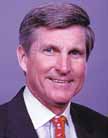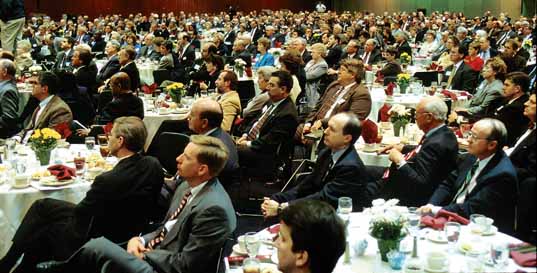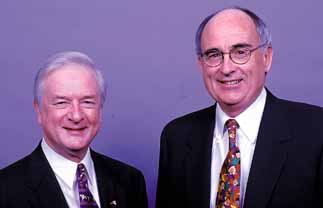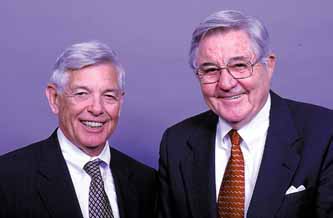
 Saying
he wants to continue NCCBI's decade-long emphasis
on improving public education while also
promoting rural economic development and
strengthening the association's ties with local
chambers of commerce, First Union Bank executive
Malcolm E. “Mac” Everett III of
Charlotte was installed as chairman of NCCBI for
the coming year. Saying
he wants to continue NCCBI's decade-long emphasis
on improving public education while also
promoting rural economic development and
strengthening the association's ties with local
chambers of commerce, First Union Bank executive
Malcolm E. “Mac” Everett III of
Charlotte was installed as chairman of NCCBI for
the coming year. Everett,
53, accepted the gavel from outgoing chairman
Earl N. “Phil” Phillips of High Point
at the association's 58th annual convention on
March 15. The change in leadership came at the
conclusion of a successful day-long event at the
Raleigh Convention and Conference Center attended
by more than 1,000 persons.
At the end of his term
at the helm of the state's largest and most
influential business organization, Phillips, the
chairman of GE Capital First Factors, told the
audience he was pleased to report that NCCBI had
earned many successes over the past year,
including his top priority — securing
increased state funding for the community
colleges.
Other goals achieved
during the past year, Phillips said, were a
substantial increase in NCCBI membership and
successful lobbying activities on behalf of a
number of public policy issues. “All is well
with your state chamber of commerce,” he
said.
“When I look back
at some of the past leaders of this
organization,” Everett said, “I realize
that many of them, like Bill Lee, Sherwood Smith
and First Union's own Cliff Cameron, are true
heroes to me. It's an honor to follow in their
footsteps.”
Many members commented
they thought the annual meeting was one of the
most successful ones in recent memory, with
entertaining, enlightening keynote speeches by
Nasdaq Market President Alfred A. Berkeley III at
the luncheon and by Howard A. “Humpy”
Wheeler, president of Lowe's Motor Speedway and a
key figure in the rapid rise of NASCAR, at the
dinner. There were large, enthusiastic crowds at
the two afternoon panel sessions, and the aisles
were full most of the day at the Information
Exchange, the tabletop trade show that boasted a
record number of exhibitors this year.

The luncheon crowd rose to its feet and cheered
as NCCBI honored Gov. Jim Hunt with its 2000
Citation for Distinguished Public Service as the
business community's tribute to his two decades
of government leadership. In presenting the award
to the governor, Jim Goodmon of Raleigh, CEO of
Capitol Broadcasting, said it represents NCCBI's
thanks for Gov. Hunt's unfailing efforts to
improve the public schools.
“He placed the
cornerstones,” Goodmon said. Ticking off
some of the governor's many educational
initiatives, Goodman listed “Smart Start,
created in 1993 to ensure that every child starts
school healthy and ready to learn; the Excellent
Schools Act, raising standards for teachers but
also rewarding them for excellence; setting the
bar higher for students; and creating a safer,
more nurturing environment for learning by
mandating swift, sure consequences for disruptive
students.”
Goodmon presented a
touching video in which dozens of young school
children thanked Gov. Hunt, and, to the delight
of the audience, flashed him the thumbs up sign.
Afterward, Hunt stepped to the podium to a
standing ovation.
“I want to thank
NCCBI for this award and to thank you for all
you've done as an organization,” Hunt began.
“The truth is, this state is on a roll. We
have a long way to go, but we're moving.”
He discussed the state's
growing reputation as an education-focused state.
He said someone in Washington recently told him
that “there is not an important conversation
in America today (about improving education)
where North Carolina is not mentioned.” He
went on to encourage the group to “stick
with it, don't give up.”

During the dinner, NCCBI presented its 2000
Citation for Distinguished Citizenship to Bank of
America Chairman and CEO Hugh McColl. Bill
Friday, president emeritus of the UNC System,
presented the award to McColl and extolled the
banker for his many contributions to civic and
social causes in Charlotte. Friday reminded the
audience that, with contributions of $100 million
last year, McColl's bank gave more in
philanthropy last year than any other corporation
in America.
McColl accepted the
award with thanks and candor. “I never set
out to do good works or earn awards for
citizenship,” he said. “I just wanted
to do business in a way that helped the
communities where we do business instead of hurt
them. This is a simple idea that has guided our
company.”
He added that, for him,
supporting civic causes was just the good
business thing to do. “We business people
don't like other people (such as government
regulators) telling us how to run our businesses.
So what I have learned is the best way to avoid
having other people telling me how to run my
company is to make a habit of doing the right
thing.”
And then he quipped:
“When you have critics, being one of the
good guys tends to take the wind out of their
sails.”
Wrapping up the annual meeting, Everett said
NCCBI “will continue our sharp focus on
education. We need to be focused on the common
goal of providing a more well-rounded education
for our young people” through new
partnerships between schools, businesses and
non-profits such as the YMCA.
“During the next
year,” he said, “NCCBI will highlight
efforts by businesses to promote education and
spotlight organizations that are leading creative
educational efforts.”
Berkeley, the luncheon
speaker, said education is one of his personal
passions as well.
“There is a
shortage of quality math and science graduates in
the United States. For a long time the easy
answer was immigration,” he said, only half
joking about stapling green cards to the diplomas
of any international students who get math and
science doctorates here. “But guess what,
those people are starting to go home now after
they finish their degrees and we have to start
growing our own.”
He talked about a
prototype of a website at which school children
could take tests and compare their scores to
those of students around the world. “We can
see where a local B+ stands in comparison to the
rest of the world,” he explained. “And
I'm afraid you're not going to be happy with what
you find.”
Adequate funding of
basic university and governmental research is a
critical need, Berkeley said. “One of our
rules of thumb at Nasdaq is that fully half of
our companies were built on technology that came
about 15 to 20 years ago from basic research
(funded by the government or the military),”
he added. “So don't skimp when you talk
about investing in science and technology.”
In the coming months
Nasdaq will be expanding into Europe and Japan,
where Berkeley thinks there will be a substantial
demand for American growth stocks as well as
interest by entrepreneurial companies in listing
on Nasdaq. “And that's the best way to world
peace. It'll be a much better world when everyone
has something to lose.”
AT the NCCBI board meeting held during the
morning of the annual meeting, directors heard a
positive report by Treasurer Horace Johnson of
Raleigh, the Ernst & Young executive, on the
financial health of the association. He said
NCCBI was finishing its fiscal year in the black
for the first time in four years. The North
Carolina magazine also ended its year in the
black, he noted.
Johnson presented a
proposed $2.43 million budget for the coming year
that he said projects a 10 percent growth in
revenue from all sources that should lead to a
year-end surplus of about $185,000. Board members
approved the budget proposal unanimously.
Gordon Myers of
Asheville, the Ingles Markets executive who as
NCCBI second vice chairman headed up the
association's annual membership drive, reported
to the board that 337 new members joined NCCBI
during the year, a record number. He said he was
happy to report that the association had met
Chairman Phillips' membership goal of “2,000
by 2000.”
Myers said the
individual board members did better than ever
before at recruiting new members and brought in a
total of 140. The top three board members in
recruitment were Kelly King of BB&T, 29;
Myers, 19; and Phillips, 10. Following NCCBI
business, John Davis, executive director of
NCFREE, spoke to the board on political trends.
Two informative seminars
were offered during the afternoon, one on rural
economic development and the other on smart
growth issues.
North Carolina's rural
areas need concrete, immediate assistance to
jump-start their faltering economies and generate
new jobs to staunch a brain drain to urban areas
of the state, panelists said at an afternoon
seminar.
Speaking at the seminar,
entitled “Spreading Prosperity to the East
and West,” panelist Billy Ray Hall,
president of the Rural Economic Development
Center in Raleigh, pointed out that the average
per capita income in rural North Carolina is only
75 percent of that in the state's urban areas.
“The rural-urban divide is still
there,” Hall emphasized, adding, “the
restructuring of agriculture particularly is
hurting Eastern North Carolina; it now costs more
to grow corn than you can sell it for.”
Myers, who served on the
Rural Prosperity Task Force appointed by Gov. Jim
Hunt, reviewed recommendations issued by the task
force. “We need you to look at these
proposals, decide if they are the right ones, and
then talk with your colleagues about how to
implement them,” he told the large audience.
Among the task force's
recommendations are proposals to improve Internet
access in rural parts of the state, to provide
funding for a Rural Redevelopment Authority, to
improve water and sewer and other infrastructure,
and to invest in programs to train community
leaders.
Panelist Andrea Harris
of Raleigh, vice president of operations at the
N.C. Institute of Minority Economic Development,
echoed the concern that rural parts of the state
are falling further and further behind. “We
have two worlds emerging,” she warned. She
suggested that existing businesses in rural
counties, which now primarily supply consumer
end-product industries, need to become more
active in primary manufacturing industries.
Mark Sorrells of Clyde,
executive director of N.C. REAL Enterprises, said
in his remarks that the state should focus on
encouraging rural residents to start their own
businesses. “We have to diminish the brain
drain that's happening in rural North
Carolina,” he said, adding, “We need to
diversify our economic development strategy and
stop focusing on just industrial
recruitment.”
Sorrells said he hoped
the public schools would begin offering programs
teaching students how to become entrepreneurs.
Now, he said, schools teach students “how to
be job applicants.”
The afternoon's second seminar,
“Smoothing North Carolina's Entry into the
21st Century,” was a well-attended panel
session with four state leaders in growth-related
issues: Sen. Howard Lee (D-Orange), co-chair of
the legislative commission to address smart
growth; Ellis Hankins, executive director of the
N.C. League of Municipalities; Janet D'Ignazio,
chief planning and environmental officer for the
N.C. Department of Transportation; and Chip
Cherry, president of the Greenville-Pitt County
Chamber of Commerce. The discussion was moderated
by Ed Scott, chair of NCCBI's Environmental
Concerns Committee.
Scott started the
session with some sobering population estimates:
it's projected, he said, that North Carolina will
gain up to 15 million people in the next 15 to 20
years.
Sen. Lee, one of the
sponsors of the original bill that resulted in
the establishment of the growth management
commission, summed up some of the
responsibilities and goals of the group. The
commission's four subcommittees will address (1)
transportation and how the state can take a
comprehensive approach, including roads, rail,
and mass transit, (2) open space and how to
maintain our undeveloped areas in conjunction
with other activities, (3) community
revitalization and encouraging the redevelopment
of brownfields and downtowns and (4) partnerships
and how to work on growth management in a
regional way.
“We've definitely
got some important issues to work on. Our state's
urban areas are concerned about traffic and
crowded schools, but we also have the
responsibility to address the lack of growth in
other areas,” Lee said.
Hankins began his
presentation by defining what “smart
growth” means to him. “When people talk
about smart growth, they tend to talk of more
compact development, growth closer to existing
municipalities, redevelopment of downtowns, and
development patterns that are easier and less
expensive to serve with public money and public
transportation,” he said. “But how do
we get there? And is there even a consensus that
this is what we want?”
Certain growth
management plans in other states like Oregon and
Maryland have been unpopular and have run up
against opposition. Another challenge that North
Carolina will face, he said, is how municipal and
county governments will work together.
“It's not an easy
task,” Hankins said. “We're dealing
with elected bodies that sometimes have
conflicting priorities.”
The DOT's D'Ignazio said
that since 1970 the state's population has grown
40 percent and that the growth in vehicle miles
traveled has increased by 160 percent.
“That statistic
alone makes my hair stand on end,” she said.
“People are driving longer, further, and I
don't care why. There are a lot of explanations
for it, but bottom line is that we have to
improve the capacity of our system. The gap is
enormous. If we don't have good mobility and
access in this state, business will suffer.”
Increased traffic has
caused “horribly congested corridors,”
tremendous delays in just-in-time deliveries for
businesses and worsening air quality across the
state.
D'Ignazio explained that
roads alone are not the answer. “DOT cannot
build roads as fast as people build houses,”
she said. Other solutions in which the department
has been involved include helping communities
apply smart growth standards, examining the
feasibility of alternative transportation systems
and mass transit, regional planning and land-use
planning.
Cherry explained how a
coalition of 42 Eastern North Carolina chambers
of commerce has begun to talk about smart growth
in the hope of learning from the mistakes of
their more urban neighbors. What's been equally
important, he explained, was defining smart
growth from a business perspective and not
letting environmentalists frame the discussion in
their own terms.
“We look at smart
growth as economic prosperity in balance with
environmental, social and economic issues. We
realize that we need to meet the needs of the
present but without compromising the ability of
future generations to meet their needs.”
The majority of the
coalition's chambers has approved the concept,
and the group will be bringing together
volunteers to address smart growth from the
perspective of its 18,000 member companies.
“We can't just let growth happen any more
than we'd sit back and watch our companies grow
without managing it,” Cherry said.
Delivering an
entertaining and informative dinner speech,
Wheeler of Charlotte, who also heads the
publicly-traded Speedway Motor Sports concern,
said NASCAR continues to grow rapidly and has
quickly evolved into a major component of the
state's economy.
He said NASCAR's
economic impact was about $400 million in 1998
but is projected to reach $1.5 billion by this
year, including indirect spending. Of that,
between $400 million and $500 million is directly
attributable to events staged at the state's two
major speedways, the North Carolina Speedway in
Rockingham and Lowe's Motor Speedway in Cabarrus
County.
He said about 1 million
fans attend events at Lowe's Motor Speedway each
year. “We need to keep this industry in
North Carolina,” Wheeler said.
“Indianapolis (home of the Indianapolis 500)
would love to get this industry. So don't take it
for granted.”
He regaled the audience
with an amusing history of stock car racing,
saying it's true that the sport has its origins
in bootleggers driving fast cars to outrun the
law. “Racing was rough and tumble in this
days” but has since grown to become the
nation's fastest-growing sport.
The luncheon invocation
was given by Dr. Thomas S. Haggai, chairman and
CEO of IGA, and the dinner invocation by Laura
Carpenter Bingham, president of Peace College.
|

